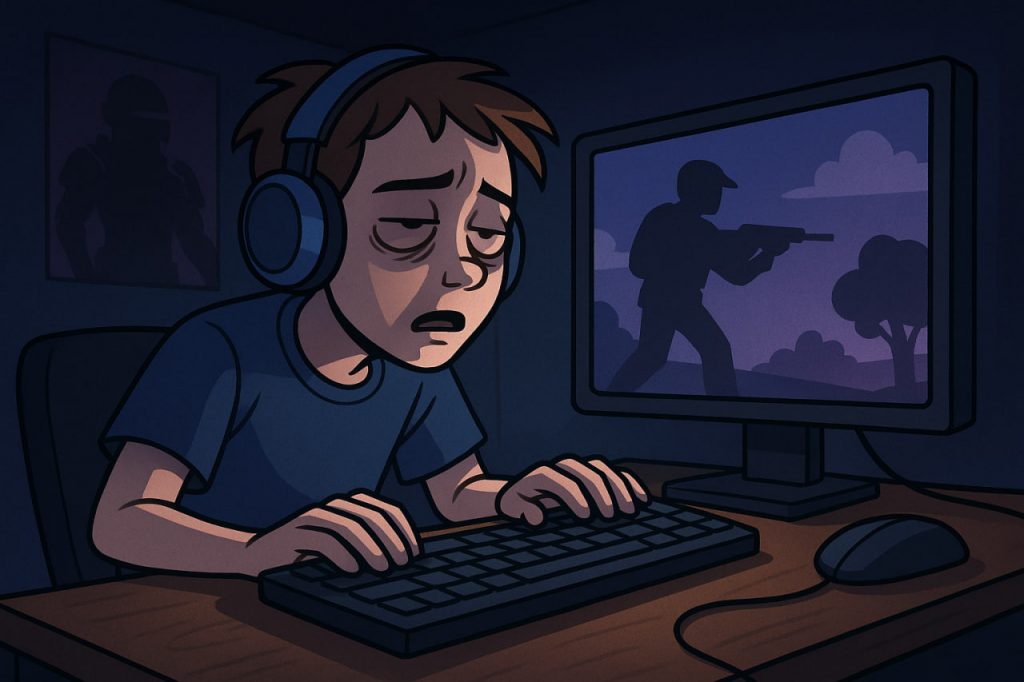Modern video games are designed to be highly immersive, realistic, and emotionally engaging. But alongside this realism comes a growing psychological concern: the phenomenon known as “shadow trance.” This is a state of deep dissociation, where players lose track of time, emotions, bodily needs, and even identity. Unlike the healthy and productive “flow state,” shadow trance is increasingly associated with harmful psychological effects — particularly in adolescents and young adults.
In extreme cases, it has even been linked to violence, emotional instability, and death.
What Is Shadow Trance and How Does It Work?
Shadow trance refers to an altered mental state during extended or intense gameplay, marked by:
- Loss of time perception (e.g., playing for 6–12 hours unknowingly)
- Disconnection from reality and surroundings
- Automatic, robotic behavior with minimal conscious control
- Blurred sense of self and emotional detachment
- Extreme irritability or aggression when interrupted
Psychologists define this as a form of dissociation — a defense mechanism where the brain detaches from real-life awareness to cope with overstimulation or emotional overload.
The Dangers: What Experts Are Warning About
Mental health professionals warn that shadow trance can:
- Weaken impulse control, especially in young brains
- Lead to emotional blunting and delayed development in teens
- Create addiction-like behavior due to constant dopamine stimulation
- Trigger violent outbursts or panic when gameplay is interrupted
- Cause physical neglect — lack of sleep, food, water, or hygiene
“It’s not just about screen time. It’s about what’s happening neurologically,” says Dr. Alan Dorsey, a child psychologist. “When the prefrontal cortex is underactive during shadow trance, it impairs judgment, empathy, and regulation.”
Documented Cases: When Gaming Turns Deadly
Sadly, the consequences of prolonged dissociative gaming are not theoretical:
- China, 2005: A 28-year-old man died after playing an online game for over 3 days without rest.
- South Korea, 2010: A young couple neglected their real baby to care for a virtual one in an online game. The infant died.
- USA, multiple cases: Teenagers have been reported physically attacking parents, especially mothers who unplugged gaming consoles mid-session. Some required psychiatric intervention.
- Japan, 2021: A teenage boy stabbed his father after being told to stop gaming late at night. He later told police he didn’t remember the incident clearly.
These real-life examples underline how dangerous extreme immersion and loss of control can become in vulnerable individuals.
How the Brain Changes During Shadow Trance
Neurological studies show:
- The prefrontal cortex (responsible for self-awareness and decision-making) becomes less active
- The dopaminergic system (linked to reward and addiction) becomes overstimulated
- The brain prioritizes game stimuli over real-world signals, similar to hypnosis or trauma response
Over time, repeated exposure to shadow trance can cause lasting changes in behavior, especially in those already dealing with anxiety, depression, or social isolation.
What Can Be Done to Prevent Harm
Experts recommend a multi-level response:
- For individuals: Track gaming time, take breaks every hour, and stay aware of physical needs
- For parents: Set screen time boundaries, talk about emotions during gameplay, and watch for red flags like aggression or emotional shutdown
- For schools and counselors: Educate students on digital addiction and promote healthy gaming habits
- For game developers: Introduce soft alerts, rest reminders, or natural game pauses to break trance cycles
- For healthcare systems: Offer therapy for those with gaming-related dissociation, such as CBT (Cognitive Behavioral Therapy) or trauma-focused care
Glossary
- Shadow trance: A deep, dissociative state during gaming marked by loss of awareness and control
- Dissociation: A psychological detachment from one’s surroundings or self
- Prefrontal cortex: The part of the brain responsible for logic, planning, and impulse control
- Dopaminergic system: Brain circuits related to reward, habit, and addiction
- Flow state: A productive, fully-engaged mental state — unlike shadow trance
- CBT: Cognitive Behavioral Therapy, used to treat behavioral disorders and impulse control


